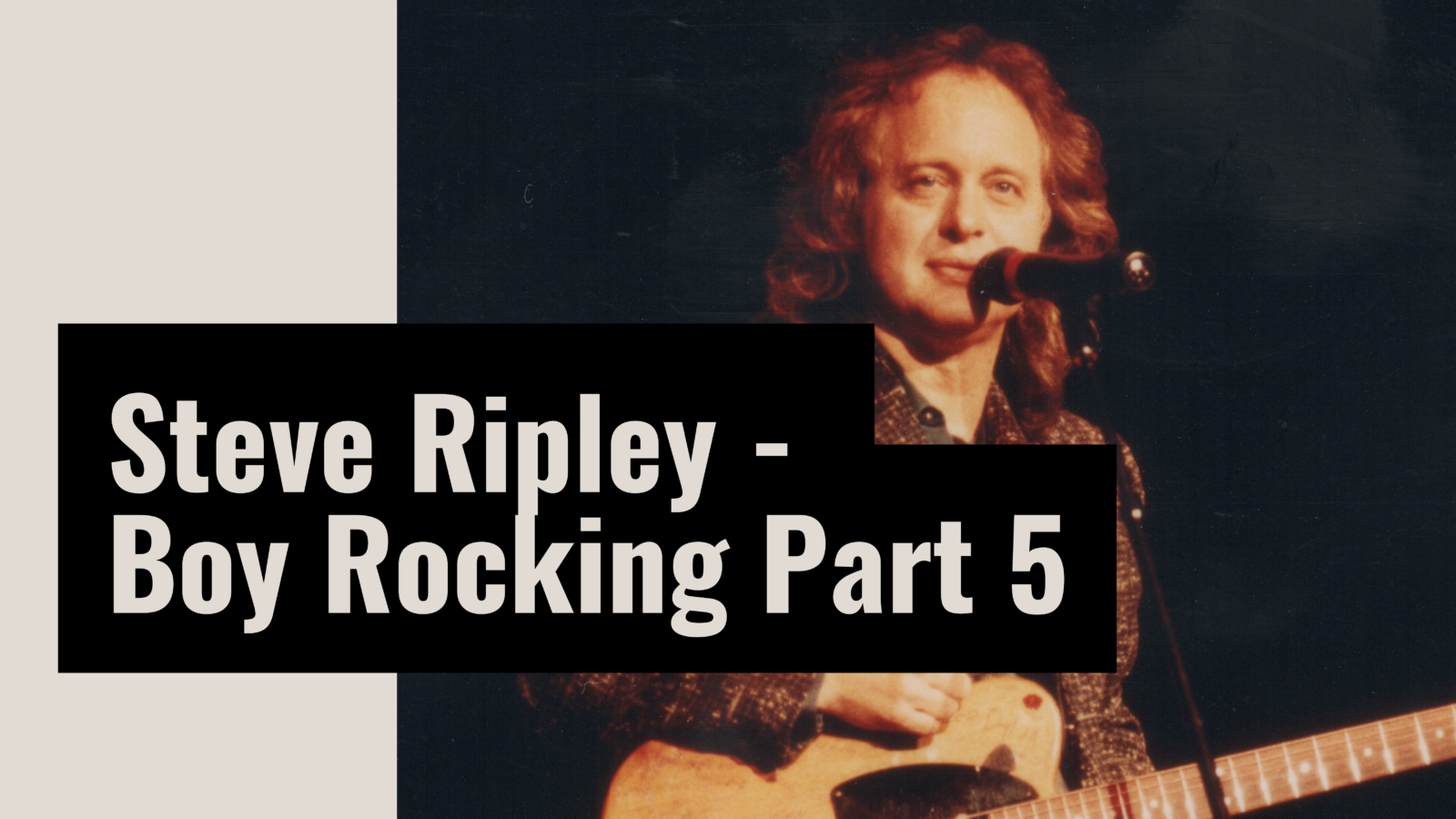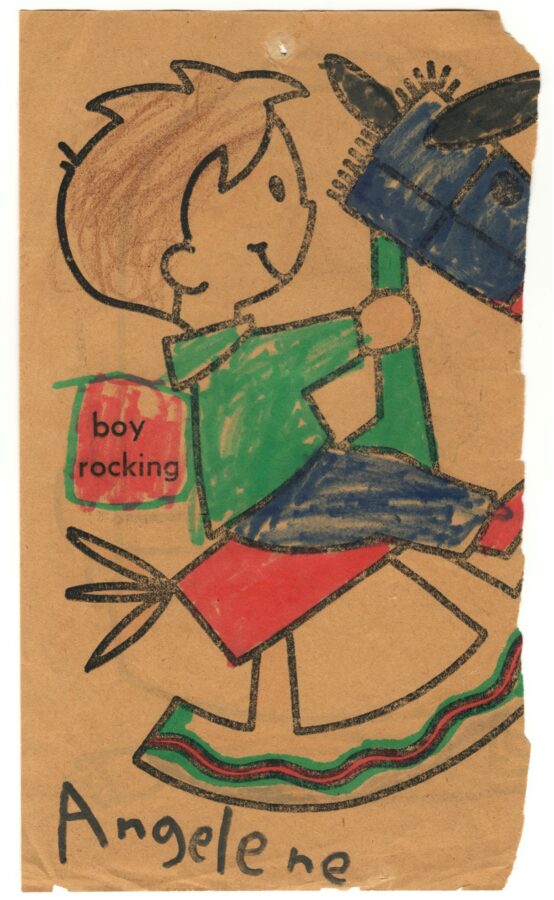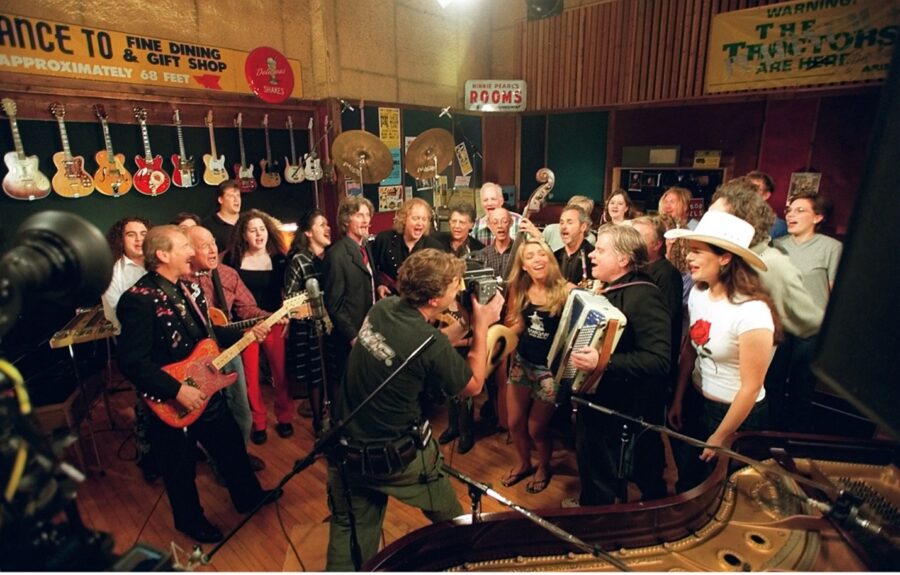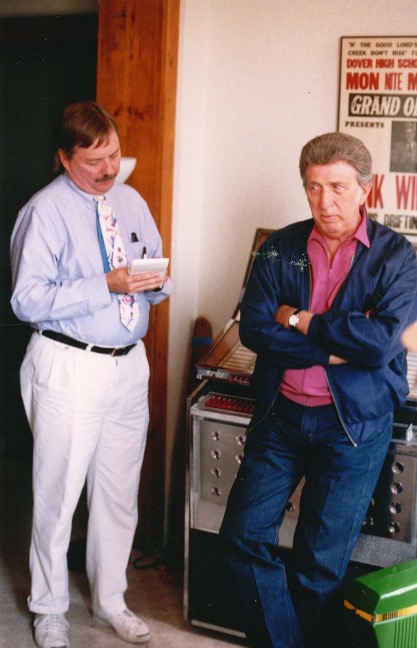Steve Ripley – Boy Rocking Part 5

After a successful decade of The Tractors most of the original members took off in different directions (see Part 4). In 2001, Steve Ripley partnered with Audium Records and Koch Entertainment to launch Boy Rocking Records. Tulsa musician, author, and keeper of unofficial Tulsa music archives, John Wooley asked me whether I was familiar with the Tractor’s label, Boy Rocking Records, and laughed as he remembered Angelene Ripley as a young child. “When she was a kid, Angelene helped come up with the name. She had colored in a picture of a little boy in a chair with the words ‘Boy Rocking’’next to it. It fit.”
The first release was Fast Girl (2001). Ripley replaced his former bandmates with a lineup that included Leon Russell, James Burton, Willie Weeks, Sam Bush, and Fats Kaplin, among others. Ripley was contacted by keyboardist Jay Spell, who was interested in working with him. Spell, a blind pianist, had worked with artists such as Tower of Power, John Mayall, Don Nix, Emmylou Harris, Randy Travis, Canned Heat, and his dear friend Ronnie Milsap, with whom he became fast friends in Junior High at The School for The Blind in Raleigh. Charlene was in the studio the day Spell came in from the airport, “Steve began to cry. He was grateful for another masterful pianist. And Jay was overjoyed. He was so excited to be a part of it that I thought he might levitate.”
It was no surprise, given Ripley’s studio prowess, that songs like Nine Eleven, as well as an upbeat cover of Dylan’s On the Road Again and the honkytonk take on Moon Mullican’s Don’t Ever Take My Picture Down, includes all of the Tractors’ earlier hits hooks, comedy, and charm. The more emotional songs, such as the melancholy Ready to Cry with Uncle Leon on the piano, and the gospel-infused, uplifting Higher Ground, are masterful, allowing Ripley to add some genuine soulfulness to his repertoire.
They say you can’t go home again but every now and then
You gotta look back to where you’ve been
Cause we’re all part of the circle that’s spinnin’ round
Lord lift me up plant my feet on higher ground–Steve Ripley, Higher Ground
On the other hand, Can’t Get Nowhere, written by D.J. Fontana and Ripley, is a punny, upbeat song and video that was recorded and filmed at The Church Studio, with trips to the Cain’s Ballroom and other Tulsa locations. Unexpected guests included Ripley’s lifelong friend, Jim Pulte, as well as James Burton, David Teegarden, Zac Hanson, and Leon’s daughter, Tina Rose appear in the video, driving around in vintage cars and VWs, walking the tracks, flying in planes, all making their way to The Church Studio. The horn section, upright bass, and steel guitar are all outstanding. The video is a peek into The Church Studio at the time and Ripley is at his most amusing. Angelene and Elvis make guest appearances as they did in almost all of The Tractor videos.
Ripley felt that Leon Russell contributed greatly to the record. According to Ken Burke, Ripley told him about recording the album with Russell:
[I said], Leon when you come to town this time it isn’t just a token appearance, you’ve got to actually play some piano. He came and it was just like I imagined what Leon’s Hollywood sessions in the 60s were like. He was really serious about it, and like I do everybody, it was all first takes. But he listened to the song one time, which I don’t generally let people do, wrote himself a little Leon Russell Hollywood chart, sat down, I hit record, and that’s what’s on those records.
He played on three songs, Ready to Cry, which is astounding. You have to listen for how much the piano is part of that record and designated what Willie was going to play on the bass. Also, Fast Girl, I’m not into hot licks anyway, but he plays the body of that song, makes it boogie and rock, then he also plays some country gospel piano on my little autobiographical song Higher Ground. He also plays some Fender Rhodes on that. You know, I don’t really stick anything out front, so you really have to listen for it, but then he played B-3 on Ready to Cry. I don’t suppose he played B-3 in 15-20 years, and I know he hasn’t played Steinway for anybody but me in 15 –20 years.
Following the release of Fast Girl, Steve put together a touring band for a few dates that included musicians Jimmy Karstein, David Teegarden, Richard Neville, Fats Kaplin, Mike Panno, Bud Deal, and guitarist Al Perkins.
On The Tractors’ second holiday album, The Big Night (2002), Ripley is joined by Elvis’s collaborators Scotty Moore and the Jordanaires and was recorded in Nashville. The Hanson brothers stopped by The Church to sing on Run Run Rudolph. Debbie Campbell, Fats Kaplin, Jimmy Karstein, Glen Mitchell, Floyd Domino, Van Beek, Tommy Tripplehorn, Richmond, and a rollicking crew of friends and family also appear.
Tulsa-based character actor and artist, Gailard Sartain, created the artwork on the cover that featured a steam-punk Christmas tree with a Leon Russell-esq top hat. It included the popular Boogie Woogie Santa Claus and Bo Diddley Santa Claus. Ripley and Kaplin’s Little Drummer Boy is the album’s standout track, featuring emotional vocals and rhythm guitar from Ripley and moving strings and accordion from Kaplin.
Although Ripley wrote and composed the song Bo Diddley Santa Claus, credit is shared between Steve Ripley and Ellas McDaniel, Bo Diddley’s given name and the one he used for authorship and copyright purposes. The song’s plot is obvious. Santa will be unable to deliver toys on Christmas Eve due to his illness. As the impending disaster approaches, Santa approaches the only person he knows who can complete his journey, “Will you drive my sleigh tonight, Bo Diddley?” And, of course, the mighty Bo Diddley does not hesitate.
My favorite on the CD is I’ve Been a Bad Boy This Year. This is a confessional about rocking and rolling too much and is easy to do the twist to. It was written by Steve’s friend Rick Vito who sings and plays guitar on the track.
FUN FACT: LARGEST COUNTRY LINE DANCE WORLD RECORD
A total of 12,168 people danced to Baby Likes to Rock It for 7 minutes 40 seconds at the Happy Valley Recreation Ground in Hong Kong, December 29, 2002.
Ripley’s solo album, Ripley (2002) is sparse and primarily vocal, with bluesy cuts such as Too Many Borderlines and the melancholy Gone Away. “The spiritualism in this collection is impossible to ignore,” Rick Cohoon described it at the time, “Somewhere floating among Ripley’s notes is an intangible but clearly audible belief in every word of every line, the kind of belief that comes from the soul. The spirit is as present in the love songs as it is in the ballads of hardship. Ripley’s debut, with all its melancholy rapture, is pure and original and is one of the year’s best offerings.”
Wooley described working with Ripley on the solo album at The Church Studio, “He asked can you give me some lyrics for a song called Gone Away, which was a beautiful but somber lament of the loss of ‘40 -‘60s popular culture.” Wooley, along with producer and songwriter Tim DuBois, gladly helped Ripley.
All the good stuff…Gone away
Idle thoughts from a rusty mind
Of another place and another time…Gone away
All gone away
Wooley ended up playing a 1965 Vox Jaguar organ on the record. He remembers how meaningful that time was. Fifteen years later, he recalls, “Bill Anderson added another verse and recorded it with the Oak Ridge Boys. It was amazing to hear my Vox wobbling in the background.” It certainly is a testament to the song’s timelessness.
Wooley said working with Ripley was thrilling and being at The Church Studio was like being a kid in a small town called up from minor leagues to the majors:
Steve Ripley, who has the best-selling album to ever come out of Oklahoma, when he calls and wants you to work with him it was like being transported to the major leagues. Not only was Ripley a genius producer and artist, but he was also generous. I co-wrote a song and got paid! Ripley compensated me for my work and gave me credit, which was unusual at the time for artists.
Wooley recalls the significance of that period in history of The Church Studio and Tulsa music. He says, “there were hit records coming out of The Church Studio. Especially with the Tractors’ recordings. Legendary people were there. Any time there was an event, I would go over and cover it for the Tulsa World. I remember D.J. Fontana, the longtime drummer for Elvis Presley who helped pioneer the backbeat swing of rock and roll, was there.”
Debbie Campbell appears prominently on the Ripley CD. It would be some of her final recorded work. According to the Ripley family, “Steve always said he loved her the maximum amount,” and after Debbie died, he said “If I ever get to heaven, one of the first things I’ll ask is, ‘Where’s Debbie’s house?”
Shortly after the CDs release, in 2003 Ripley was inducted as a Red Dirt Hall of Fame member, along with Bob Childers and Tom Skinner. The first (and only) annual Red Dirt Music Awards was held at the historic Cains Ballroom in Tulsa. John Cooper described Ripley as “not being the kind of guy who took to receiving awards. He thought others were more deserving.” However, “this young guy from Stillwater, Josh Quillin, loved Ripley and Red Dirt music and he organized what he thought would be an ongoing Red Dirt music award. He enlisted the help of Marc Ringwood, another Red Dirt fan from Seattle, and the event was held at Tulsa’s Cains Ballroom. The venue was packed. I believe Steve accepted the award because he was honored alongside Skinner and Childers, both of whom he admired. Despite numerous invitations, he refused to accept an award from the Oklahoma Music Hall of Fame, but he did accept the Red Dirt Award.”
By 2005, The Kids Record Aka Chicken Covers by Uncle Steve and The Tractors was released. Ripley shared his thoughts on the Kids Record as he was making it to Ken Burke. “I did sing This Old Man He Plays One, and my version really hits a Tractors groove. Then I did Old Macdonald, you haven’t lived until you’ve heard me go “E-I-E-I-O” and the chicks go cluck and all that. (Laughs.) Somebody once said, ‘All the Tractors albums really are kid’s records, we’re just calling this one a kid’s record.’ (Laughs.) We did Shortenin’ Bread and Baby Likes to Rock It. The reason we sold two million records Tractors records was because kids loved it – something about choo-choo trains. It had a groove.”
Ripley explained that “This is something I have wanted to do ever since my own kids, Elvis and Angelene, were little, 20+ years ago. As a matter of fact, the song I made up and sang to them when they were small is included on the new CD. It’s called Spin Around When They Dance. They ran/jumped/danced around the house in a very crazed fashion, acting out the lyrics and screaming until their faces turned red.” Charlene recently told me “It’s just so special and it’s here for our little kids and the ones that are yet to come.”
The album included many of Ripley’s Oklahoma artist friends like Jim Sweeney, the Red Dirt Rangers, Randy Crouch, and Casey Van Beek. Fats Kaplin – as usual – always by his side. Jimmy’s Fishin’ Song was written by Jim Edwards. Jared Tyler sings background vocals. The title cut Chicken Covers features the great Mickey Raphael on harmonica. Tulsa actor and artist Gailard Sartain created all the fun, silly farm artwork on the CD.
Deborah McLaren
- TAGS: Angelene Ripley, Bo Diddley, Boy Rocking Records, Cains Ballroom, Canned Heat, Charlene Ripley, D.J. Fontana, David Teegarden, Don Nix, Elvis Presley, Emmylou Harris, Fast Girl, Fats Kaplin, Gailard Sartain, Gone Away, Higher Ground, James Burton, Jay Spell, Jim Pulte, Jim Sweeney, John Mayall, Leon Russell, Oak Ridge Boys, Randy Travis, Ready to Cry, Recording Studio, Rick Cahoon, Ronnie Milsap, Sam Bush, Steve Ripley, The Church Studio, The Church Studio Blog, The Tractors, Tina Rose, Tower of Power, Tulsa Oklahoma, Zac Hanson



